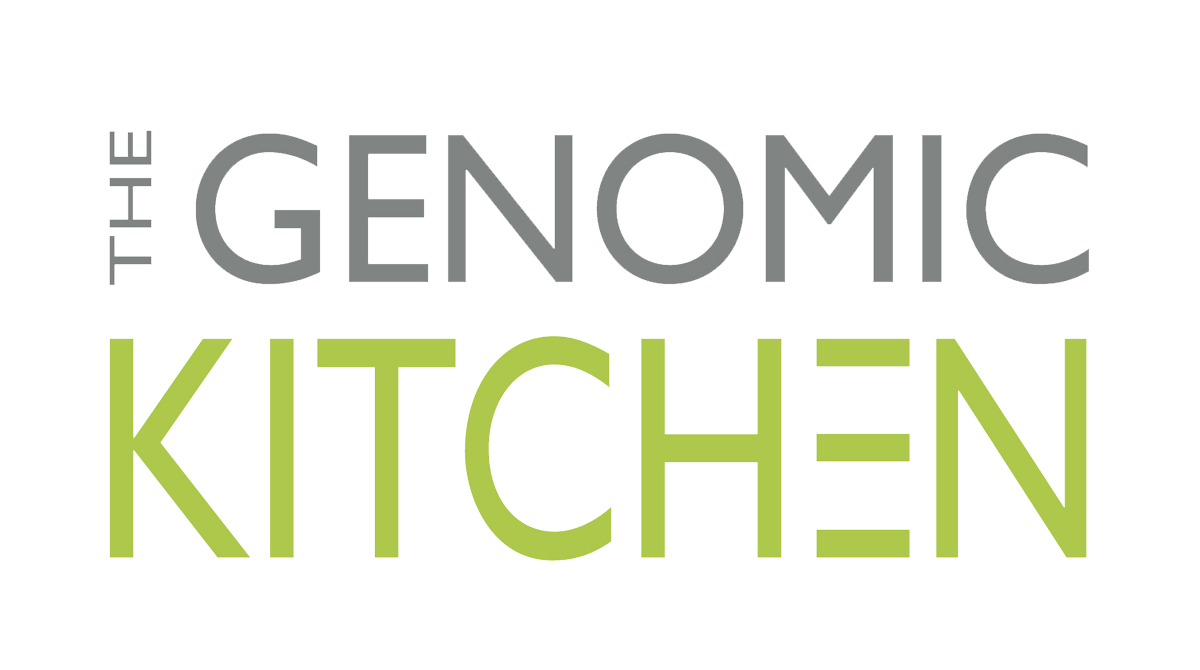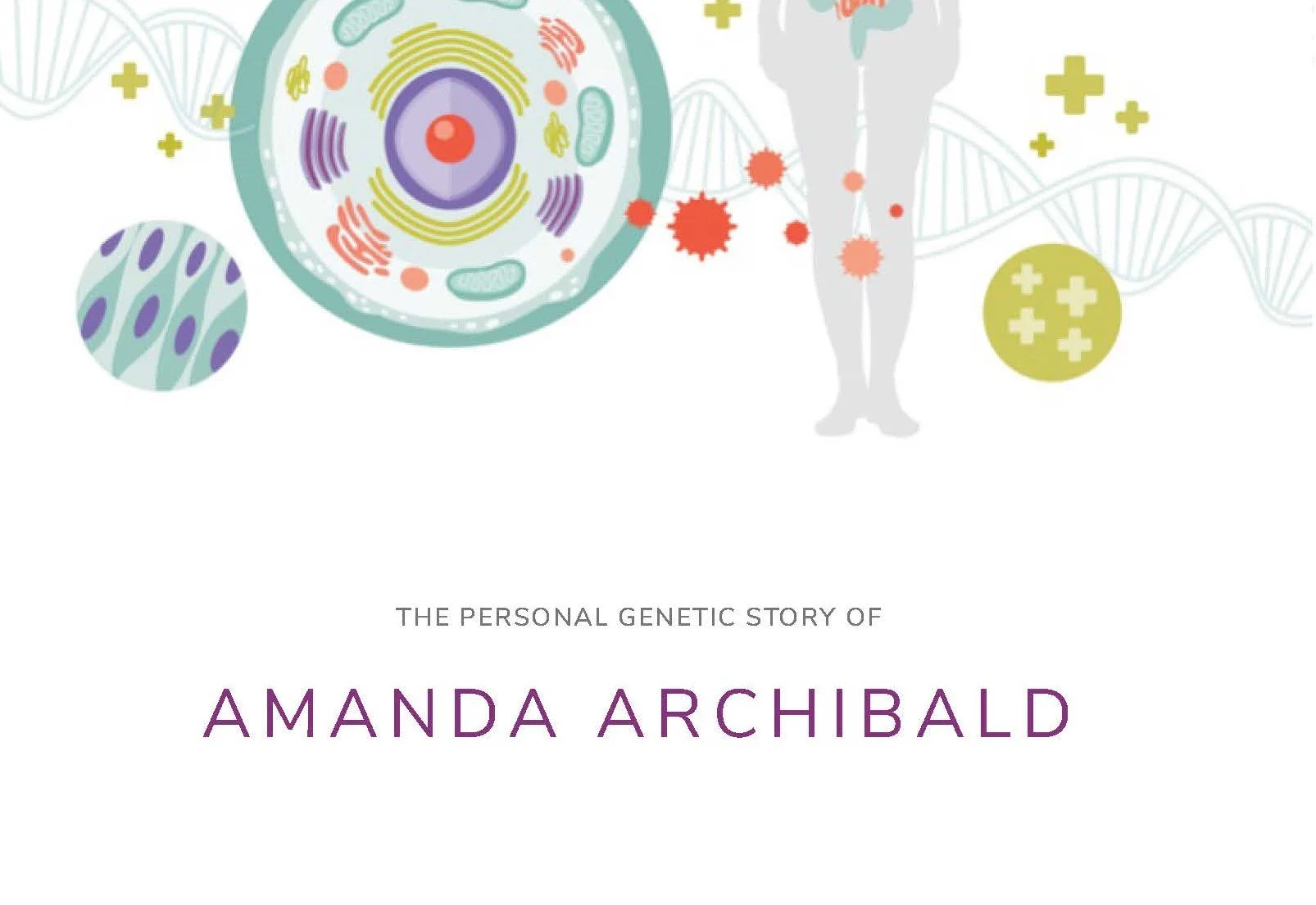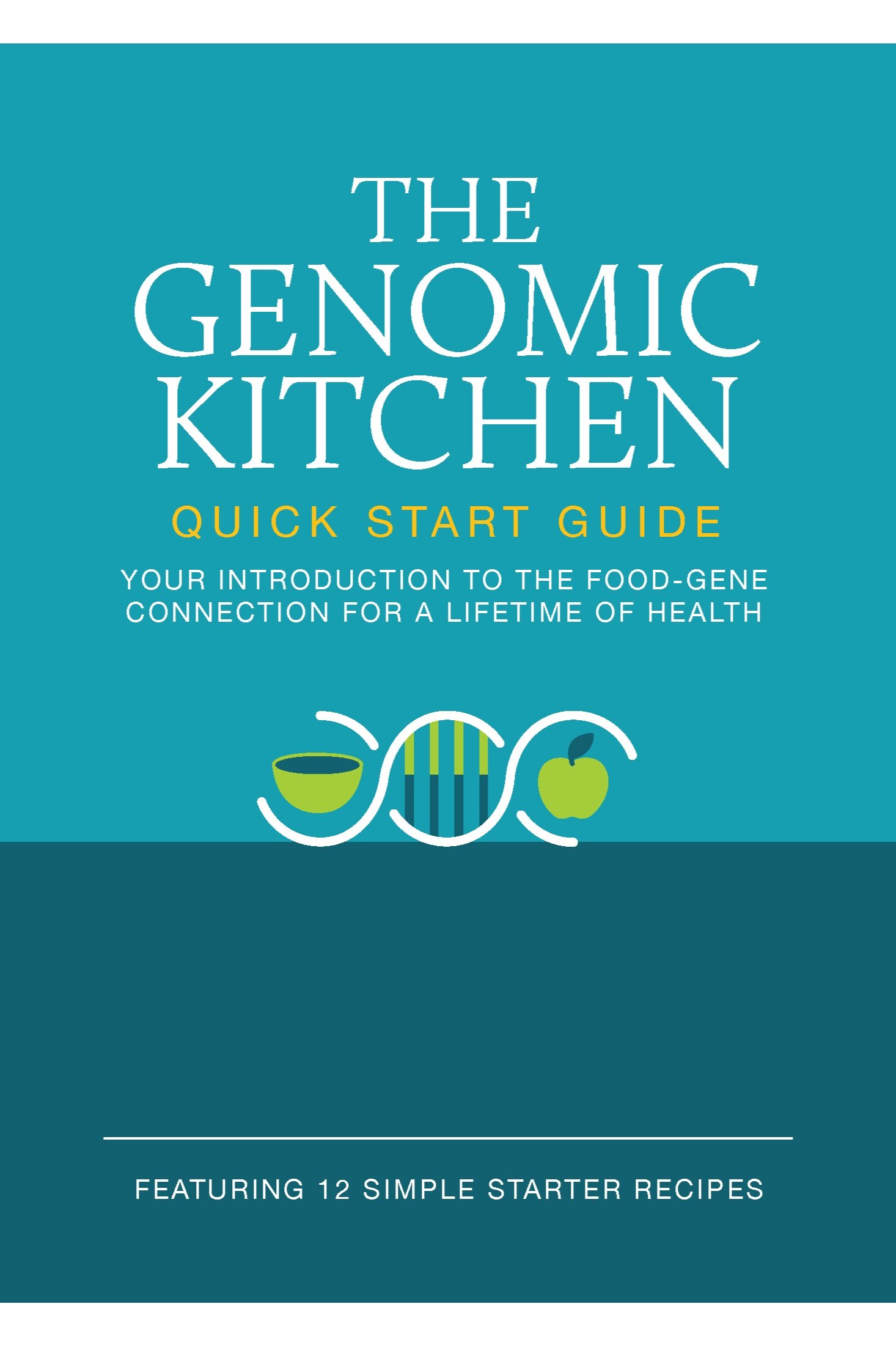Use the Power of Nutrigenomics for Your Best Health
/Nutrigenomics (nutrition + genomics) is the cutting-edge science of personalized nutrition that shows you how to create the best path for your health. Whether you are looking to boost your immune system, reduce inflammation, improve your bone health, manage diabetes, or support your nervous system, nutrigenomics helps you uncover your body’s unique prescription for the best foods and supplements for you.
There's a lot of nutrition noise in our world. You only have to search the internet to find untold numbers of supplements and recipes that claim to influence health and share nutrition rules that apply to everyone equally. But how do you know if those generic recommendations will help you reach your personal goals, given your genes and health history that's true?
Your genes hold a unique recipe for every protein your body makes. Every protein directs a function in your body. This is why knowing which foods and nutrients affect which genes (i.e., nutrigenomics) is a critical path to health.
Nutrigenomics allows us to see past the noise of nutrition rules, fads, and advertising.
Now we can "lift your body’s hood" and see which genes are behind health issues or deficiencies. When we know which genes you have, we can expertly target them with nutrition, and that’s when you start seeing real progress toward your health goals we're looking at, nutrigenomics allows us to know which nutrients that influence those genes.
We all have a unique combination of genes that we inherited from our parents. While these genes may stay with us our whole lives, nutritional genomics has opened the door to advising us how specific nutrients and foods can influence genes to behave the way we want them to. The science of nutrigenomics allows you to strategically use nutrient-gene interactions to your benefit.
Simply put, nutrigenomics informs us which nutrients and foods influence our genes toward optimal health.
This is how we can use nutrition to achieve optimal health—regardless of what genes you were born with.
In this blog article, I describe what nutrigenomics means to you, and whether you need a genetic test or not to take advantage of it.
Nutrigenomics Example 1: Reducing Inflammation by Turning off Inflammatory Genes With Food
Inflammation is your body’s natural response to infections, sprains, injuries, etc. At first, it has an important job to do so your body can heal itself, and then when its work is done, the inflammation is supposed to taper off. However, when inflammation continues far beyond its usefulness and becomes long-term, this is associated with so many chronic diseases and ailments.
Unfortunately, too much inflammation lasting for too long is all too common. Chronic inflammation is linked with diabetes, low bone density, and even early demise. This is another area that is full of nutrition fads and generic recommendations. So, how would you go about reducing this inflammation using the precision of nutrigenomics?
This is where knowing your genes can help you target your inflammation in a way that’s unique to you.
Let’s put this into perspective.
Certain genes can cause inflammation or tame it. When you know which genes you have, you can plug the right foods in to reduce inflammation in a way that works for your unique self. This ability to get personalized nutritional counseling dampens the noise around generic anti-inflammatory food and supplement claims and leads us straight to the specific foods and nutrients that work with your genes as anti-inflammatories.
Here's an example: When it comes to inflammation, we know that the allium family such as onions, garlic, leeks, etc. can turn off the inflammatory TNF-alpha gene. Elderberries, capers, turmeric (especially the roasted root) and radishes can do the same thing! This is unlike taking a supplement that claims to tame inflammation. Nutrigenomics gives us precise information based on the nutrient-gene interactions so that we can have more confidence that you will see results.
Now you see the value in knowing which genes can help and hinder your health, and the nutrients that influence them. This is the power of nutrigenomics.
Nutrigenomics Example 2: Getting Enough Vitamin D by Knowing Your Genes
Vitamin D is a classic example of how one person’s needs may differ from someone else’s, based on their genes.
Vitamin D is essential to our health. Beyond bone health, not having enough Vitamin D is linked with an increased risk for heart disease, diabetes, some cancers, and lowered immunity. Deficiency is surprisingly common. Almost 40 percent of Americans are deficient in Vitamin D—and most don't even know it.
Let's talk about how your genes can influence your Vitamin D status so that you can use it to your advantage.
First of all, we obtain Vitamin D either from the foods we eat or by exposing our skin to sunlight. However, many foods rich in Vitamin D are no longer eaten, or they are eschewed—such as liver, butter, and eggs (from free-range animals). Therefore, what you eat is no longer a guarantee that you're getting enough Vitamin D.
But getting enough Vitamin D (from food or the sun) is just the beginning. The Vitamin D you do get goes along a complex biochemical path so that it can be "activated" to do its jobs protecting your health and prevent any deficiency symptoms. This is because the form of Vitamin D that comes directly from food and the sun isn't active—it doesn't do much. It must be activated. This requires multiple steps and uses multiple “activation” enzymes in our liver and kidneys.
What happens if one of those enzymes along the pathway of Vitamin D activation isn't quite right? What if you have a tiny error in the gene that codes for one of these enzymes? This is not uncommon and can occur when any of the genes encoding these enzymes have a variation called an SNP (Single Nucleotide Polymorphism (more on this below). These genetic variations can impact the amount of Vitamin D your body can use—even if you are getting enough Vitamin D (precursor) from food and the sun!
And, to take this a step further, even if you have enough of the active form of Vitamin D, it still needs other things around it to do its job. One of these necessary items is the Vitamin D receptor. When the active Vitamin D comes knocking on a cell’s door, it needs a receptor to let it inside the cell.
This receptor is also coded by our genes, and if there is a small variation in your Vitamin D receptors, it may not be welcomed in to do its essential role for your health. If this happens in an intestinal cell, for example, it won’t allow your gut to absorb very much calcium from your diet, and this can lead to other issues with calcium deficiency.
As you can see, your genes code for enzymes to activate Vitamin D and for cell receptors that allow Vitamin D to communicate with, and into, your cells. If you know that your genes for Vitamin D activation or receptors have SNPs, you may be recommended to take more Vitamin D than the generically-recommended amount.
How to Use the Power of Nutrigenomics
When you know what your unique genetic blueprint is, you can get a personalized nutrition plan that works for you. That may look like eating more alliums, or taking specific Vitamin D supplements or extra calcium, or perhaps something altogether different, based on your genetic testing report.
This is precisely why genomic testing (personalized DNA testing) helps us to see through nutrition fads and empowers you to get personalized nutritional counseling that can work for you.
When we understand how to navigate your unique biochemical circuitry by understanding your personal gene blueprint, we can ensure that you get enough of the right food (or supplement) for your health.
And remember that it's not just genes that influence what we should eat and how much, but what we eat can influence our genes as well. Science shows us that there is a two-way street. This is the science of nutrigenomics!
Even though we may have inherited certain genes that code toward health or away from it, how powerful those genes are is influenced by what we eat!And if we can influence how much our health-promoting vs. disease-promoting genes work, imagine how much healthier we can be and feel!
Science now shows that nutrition has a powerful influence on how much each of your genes affects your health. Much more powerful than we thought. This is the power of nutrigenomics.
Nutrigenomics = Nutrition + Genomics
Your genes are powered by information located in the food you eat
While there are many elements that provide information to our genes, such as stress, exercise, and environmental toxins, nothing is more influential than food and its resident nutrients.
Nutrition is the principal source of information genes work with.
The science of nutrigenomics allows us to understand how the food we eat, specifically nutrients (like vitamins, minerals, carbs, and fats, etc.) and other components in food called bioactives (they actively affect our biology), interact with our genes and influence what they do.
Nutrigenomics gives us new insight into how food works in the body influencing health at the gene level. Genes are the pivot that food interacts with to produce proteins that guide every aspect of how the human body works. This is why nutrigenomics is a critical path to health.
As we get older and are exposed to things like toxins and free radicals our genes can make more mistakes. Nutrigenomics has highlighted another way our food and nutrients affect our genes. The science shows us how certain foods and nutrients can stabilize our genes and prevent some SNP (gene) variations. So, now we know that by eating certain foods we can help our genes correct these errors, or create “workarounds,” and keep our proteins and cells (and entire body) in optimal health.
Nutrigenomics has taken personalized nutrition to the next level.
The gene level.
Do We Need Genomic Testing to Benefit From Nutrigenomics?
As you now know, nutrigenomics is the science of personalizing your nutrient intake based on the nutrient-gene interactions happening in your cells. But what makes us as individuals unique from one another? And, how much do these differences this really matter? Is it worth testing for?
Overall, we share approximately 99 percent of the same genes with each other. After all, genes are what make us human. What differentiates us are those variants called SNPs.
These variations are tiny differences we all have in our genetic information that is used to create individual protein “recipes.” These SNPs can determine whether the protein that is created is functioning the way it should be, or whether it's not working to its full capacity. Whether your inflammatory genes are turned on or off, or whether your Vitamin D activation enzymes and receptors are being made correctly. When a protein is not showing up to work on time in your body, or slacking on the job, it sometimes requires additional nutrient support from a specific food or even a supplement. This is how you can really feel the benefits of getting personalized nutritional counseling.
In a nutshell, I personally recommend consumer genomics testing because I see the difference it has made in my and my clients’ health. The process of getting a test done is simple and painless.
The test starts when you receive a home DNA test kit to collect a saliva swab. This comes with ready-to-go express shipping to get it straight back to the lab. After about 3-4 weeks, you’ll receive a securely transmitted report of your lab results that will advise you on your genetic strengths and deficiencies. To get the most out of this report, you can consult with a clinician specializing in nutrigenomics to walk away with a solid understanding of your next steps including idea food choices, supplement recommendations, and even a meal plan.
Having said that, if you are starting out or don’t have immediate health concerns, you don’t have to make the testing a priority right now
While genomic testing (this is often also called Nutrigenetic Testing) provides the clearest insights into YOUR unique gene blueprint, all human genes respond to food the same way. The difference between you and I is that you may need more Vitamin D than I do, and that’s an example of a detail that would be found via nutrigenomic testing. The bottom line is still that ALL of us need Vitamin D and all of us need those activation enzymes working as well as possible!
Here’s an analogy. Cars use the same basic mechanics to move. Differences in the make and model of a car don’t change the fundamentals of how the engine makes the wheels turn! The type of fuel a car needs may change, but its engine still turns the wheels. It’s the same for humans. We all need food and nutrients and we all use them the same way. Nutrigenomics tells us which foods work with which genes.
The human body uses this same food information in the same way to perform the tasks of being a (healthy or not-so-healthy) person. Genomic testing allows us to pinpoint these fine differences between different people and adjust your food approach to maximize your benefits. The fundamentals of eating and using food don’t change.
However even without a test, you And we can use the science of nutrigenomics to understand which foods to choose to target genes that influence our health, without needing to get a test, even if it’s not as finely-tuned as it could be with a test.
Click Video Below to hear Amanda discuss what she sees when she looks at a genetic (Nutrigenetic) test
Which Foods Does Nutrigenomics Say to Eat?
Nutrigenomics gives us a guide to the best food choices to make based on how genes work in our bodies.
It is for this reason that we created The Genomic Kitchen Ingredient Toolbox. Our Ingredient Toolbox contains familiar ingredients that you can immediately put on your grocery list and easily add to your plate. These ingredients are organized into a system we call M.I.S.E. The M.I.S.E. system is rooted in the science of how food influences master genes that impact long-term health. Choosing these ingredients allows you to eat in harmony with genetic pathways associated with oxidative stress, inflammation, and metabolism and optimize gut health. They allow you to start the journey of fine-tuning the biochemical circuitry of your body and eat in accordance with the language and flavor or human DNA.
To learn more about the best food choices you can make for your genes, click the image on the right to access to our Genomic Kitchen Ingredient Toolbox Quick Start Guide.
Also check out the GENEius Cooking Course I developed with Chef partner (and clinician) Kate Waters
References
Neeha VS, Kinth P. Nutrigenomics research: a review. J Food Sci Technol. 2012;50(3):415–428.
Rana S, Kumar S, Rathore N, Padwad Y, Bhushana S. Nutrigenomics and its Impact on Life Style Associated Metabolic Diseases. Curr Genomics. 2016;17(3):261–278.
Sales NM, Pelegrini PB, Goersch MC. Nutrigenomics: definitions and advances of this new science. J Nutr Metab. 2014;2014:202759.
German JB, Zivkovic AM, Dallas DC, Smilowitz JT. Nutrigenomics and personalized diets: What will they mean for food?. Annu Rev Food Sci Technol. 2011;2:97–123 References
Genetic Lifehacks (2018, February 16). Shining genetic light on your vitamin D levels. Retrieved from https://www.geneticlifehacks.com/vitamin-d-genetics/
He, H. Y., Liu, M. Z., Zhang, Y. L., & Zhang, W. (2017). Vitamin Pharmacogenomics: New Insight into Individual Differences in Diseases and Drug Responses. Genomics, proteomics & bioinformatics, 15(2), 94–100. https://www.ncbi.nlm.nih.gov/pmc/articles/PMC5414710/
Krainer, J., Siebenhandl, S., & Weinhäusel, A. (2020). Systemic autoinflammatory diseases. J Autoimmun, 102421. https://www.sciencedirect.com/science/article/pii/S0896841120300329?via%3Dihub
Mead M. N. (2007). Nutrigenomics: the genome--food interface. Environmental health perspectives, 115(12), https://www.ncbi.nlm.nih.gov/pmc/articles/PMC2137135/
National Institutes of Health. (2018, October 28). What is the Human Genome Project? Retrieved from https://www.genome.gov/human-genome-project/What
National Institutes of Health. (n.d.). The genetic basics: What are genes and what do they do? Retrieved from https://history.nih.gov/exhibits/genetics/sect1a.htm
Parva, N. R., Tadepalli, S., Singh, P., Qian, A., Joshi, R., Kandala, H., Nookala, V. K., & Cheriyath, P. (2018). Prevalence of Vitamin D Deficiency and Associated Risk Factors in the US Population (2011-2012). Cureus, 10(6), e2741. https://www.ncbi.nlm.nih.gov/pmc/articles/PMC6075634/









